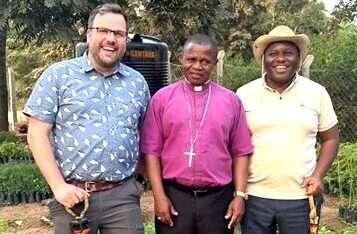A small amount of money in Canada goes a long way elsewhere. When we support Alongside Hope (formerly PWRDF), our funds are put to good use to improve the lives of people around the world. In June, I had the privilege of travelling to Kenya with other board members to learn about the type of initiatives Alongside Hope supports.
Learning About Local Initiatives
The projects we saw varied but mainly focused on implementing resilient agricultural practices to support livelihoods.
Our trip started along the Indian Ocean. In Kilifi, the Kenyan Evangelical Lutheran Church, using funding from Alongside Hope through the ACT Alliance, supports local “self-help groups” implementing new agricultural practices and partnered with local government officials to support agricultural resilience.
Here, the assistant county commissioner let us know of her appreciation for the support we had provided to help with local efforts that contribute to the nation-wide initiative to plant 15 billion trees. We planted trees in support of the initiative and visited three local growing projects for seedlings that support small-scale farming initiatives.
Further up the coast, in the Tana River Delta, we visited communities affected by drought and floods. We heard how more extreme weather has caused challenges for the community. The previous year, flooding within the river delta displaced local communities and caused conflict between pastoralists and herders. Church World Service (CWS), an Alongside Hope partner, provided emergency food assistance to displaced communities, and then, as the situation improved, supported small-scale farming initiatives with chickens and honeybees. Community members told us how the support from CWS helped members of different backgrounds and religions in their community support each other.
Collaborating with ecumenical partners and local, well-established NGOs ensures that the work responds to community priorities and has a durable impact. Alongside Hope runs a lean operation and does not have its own staff overseas. Rather, they support local partners to accomplish a shared mission.
Moving inland, in Embu County, we learned about a project Alongside Hope supports through local partner Eclof Kenya, a microfinance institution supported by Protestant churches, when we met members of the Kawanjara Dairy Cooperative. Here, small-scale local farmers receive training and can observe a model farm that implements climate-smart agriculture initiatives for inclusive and resilient dairy farming.
I was deeply impressed by the training that was provided to local farmers on improving milk production through innovations like biogas production, manure management, fodder management, newly incorporated plants and technology to efficiently produce silage. Eclof also supports the local cooperative through a local milk clearing house.
The next day, in neighbouring Kitui County, we learned about projects operated by the Anglican Church of Kenya’s development agency, Anglican Development Services, with support from Alongside Hope. Our host was the Anglican Development Services – Eastern (ADS-Eastern). We met Bishop Gedion Muneni Nzoka, Bishop of Kitui, who accompanied us for the day as we visited ADS-Eastern projects.
Here, in local communities that often did not have an Anglican presence, we again met small-scale agricultural collectives supported by ADS-Eastern staff. Like some other projects we saw earlier in the week, the focus was on training and developing local knowledge to pool funds and improve agricultural practices in raising livestock and vegetables. Local initiatives varied by community needs and included training on Gender Based Violence, support for people with disabilities, and a community managed tree nursery with a solar powered well and cistern.
The Kenyans we met were delighted with Alongside Hope’s new name. They recalled the challenges of the complicated five-consonant acronym: PWDR… RD… PWRF… PWRDF! Alongside Hope is much easier to remember, though adjusting to the new name takes some time.
I was impressed with the organization of local committees who support each other with new agricultural innovations. Many local groups were proud to present their work to us and show us the crops they had grown or animals they were raising. For me, the clear delineation of responsibilities within their groups was remarkable. The chair, vice-chair, secretary, and treasurer would identify themselves and often there would be deputies for some positions as knowledge was shared and mentorship was provided to younger group members. The importance of clearly identifying how each person contributes to the goal of an organization is a lesson I take back with me.
Good governance is needed not just in local communities where projects are implemented, but also in ensuring responsible management of organizations. In Nairobi, we had a roundtable conversation with leaders of the organizations whose projects we visited and some other ecumenical partners, including the National Council of Churches of Kenya. During the meeting, John Mutua, the Executive Director of Kenya’s Anglican Development Services – Eastern, reminded us all that “good governance and policy don’t guarantee success but their absence almost guarantees failure”.
Grappling with challenges
During the trip, we heard from CWS and other agencies that the abrupt decrease in funding from the US government has left organizations eager to find new partners to support their work. Many aid organizations in Kenya have had to significantly cut back programming and staffing given drastic decreases in support for their work from American and other funding agencies.
While in Nairobi, we met with Canada’s High Commissioner, Chris Thornley. He reminded us to focus on the needs not just in Kenya, but also in Burundi, Somalia, and other countries which face severe humanitarian challenges.
It is not possible for one organization to respond to every need, and we cannot completely fill the gap left by the sudden shift from the Trump administration. However, I have seen the value that development assistance provides. I feel compelled to advocate for continued support for international development and humanitarian work from our government and to continue giving as I am able in support of, as the Alongside Hope vision statement declares, working towards a truly just, healthy and peaceful world.


